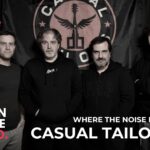Now Reading: FTC and Seven States Sue Live Nation and Ticketmaster
-
01
FTC and Seven States Sue Live Nation and Ticketmaster
FTC and Seven States Sue Live Nation and Ticketmaster


Photo Credit: Blanche Serendipity
The FTC and seven states sued Live Nation and Ticketmaster for allegedly coordinating with brokers in illegal resale tactics.
This week, the Federal Trade Commission (FTC) and seven states—Virginia, Utah, Florida, Tennessee, Nebraska, Illinois, and Colorado—filed a lawsuit against Live Nation and Ticketmaster with allegations of engaging in illegal ticket resale tactics.
According to the filing in the U.S. District Court for the Central District of California, Live Nation and Ticketmaster coordinate with brokers and allow them to harvest millions of dollars in tickets in the primary market. The ticketing platform then sells those tickets at a substantial markup on the secondary market.
Further, the FTC alleges that Ticketmaster and its parent company Live Nation deceived artists and consumers by engaging in “bait-and-switch pricing” by advertising lower prices for tickets than what consumers must actually pay. They also allegedly claimed to impose strict limits on the number of tickets consumers may purchase for an event, while ticket brokers “routinely and substantially exceeded those limits.”
Ticketmaster controls around 80% of major concert venues’ primary ticketing, as the leading provider of tickets for concerts. It also has a growing share of ticket resales in the secondary market. From 2019 to 2024 alone, consumers spent over $82.6 billion purchasing tickets from Ticketmaster, the FTC writes.
According to the FTC, in public, Ticketmaster maintains that its business model does not permit brokers that routinely exceed ticket limits. But in private, Ticketmaster has allegedly acknowledged that its business model (and bottom line) benefits from brokers “preventing ordinary Americans from purchasing tickets” to shows at the prices artists have set.
The FTC has been investigating Live Nation and Ticketmaster for alleged violations of the Better Online Ticket Sales (BOTS) Act, seeking civil penalties against Ticketmaster as well as any monetary relief deemed appropriate by the court.
Now, artist and consumer advocate organizations are speaking out to applaud the FTC’s efforts. These include the National Independent Talent Organization (NITO), the National Consumers League (NCL), and the National Independent Venue Association (NIVA).
“NITO applauds the Federal Trade Commission’s efforts to reform an unfair ticketing ecosystem that too often does not serve consumers or artists. Changes are needed that address excessive fees, availability of tickets for fans at fair prices, and keeping the process aligned with artists’ interests that benefit their fans,” said the National Independent Talent Organization (NITO), the trade organization for U.S. independent booking agents and managers and the artists they represent, in a statement to Digital Music News.
“NCL applauds the FTC and state attorneys general for bringing this landmark action against Live Nation and Ticketmaster,” John Breyault, Vice President of Public Policy, Telecommunications, and Fraud, National Consumers League (NCL), told DMN. “The allegations laid out by the FTC make clear what NCL has long argued: far from being an innocent victim of ticket resale, Live Nation profits from it immensely. By working hand-in-glove with ticket brokers to circumvent ticket limits and then reaping billions in fees on the resale market, Live Nation has sought to corner the secondary ticketing market just as it has monopolized the rest of the live events industry.”
“For years, consumers and artists alike have paid the price for this anticompetitive and deceptive conduct—through hidden fees, inflated resale prices, and diminished trust in the live event marketplace. Today’s action is a vital step toward holding Live Nation accountable, restoring fairness, and ensuring that fans, not monopolists, are the ones who come first in live entertainment,” Breyault continues. “It also underscores the urgent need for Congress the pass the bipartisan TICKET Act, which would codify much-needed transparency and consumer protections into law, ensuring lasting reform of a market long tilted against fans.”
NIVA’s Executive Director Stephen Parker told Digital Music News, “Today’s lawsuit has given credibility to what fans, artists, and independent stages have believed for years: Live Nation and Ticketmaster exploit their dominance not just in concert promotion and primary ticketing, but in the resale market as well. The FTC and seven states now allege that the same company that controls nearly 80% of major concert ticketing has been enabling scalpers to game Ticketmaster’s system, reselling tickets back to fans at massive markups.”
“This is not just bad business; it is deception and abuse of monopoly power. By turning a blind eye to scalpers, even giving them the tools to bypass limits and harvest tickets, Live Nation has acted as the promoter, the primary ticket seller, the artists’ manager, and the scalper.”
“Independent venues and promoters are on the frontlines of this broken system, and it is fans and artists who ultimately pay the price. We applaud the FTC for bringing this case. It further bolsters the U.S. Department of Justice and 40 state attorneys general antitrust case against Live Nation. “
“We now urge Congress, the Administration, and state legislatures to stand with consumers by banning speculative tickets (tickets the scalper does not have), prohibiting deceptive resale sites, and capping resale prices and fees. Predatory resellers – including Live Nation itself – should no longer be allowed to gouge and deceive fans under the guise of access to live music.”

























